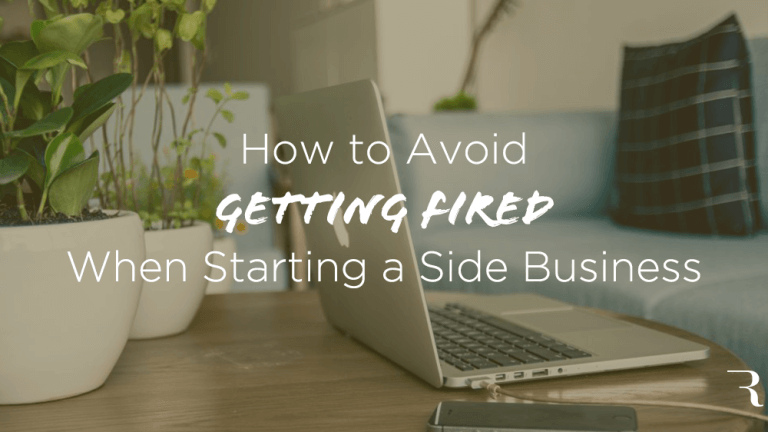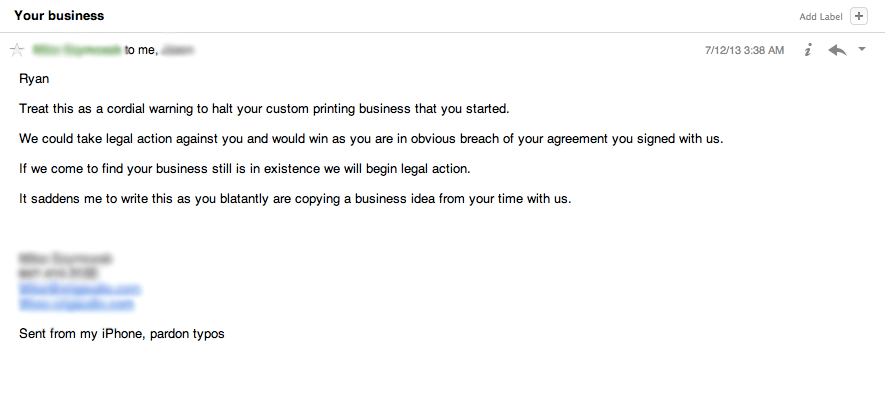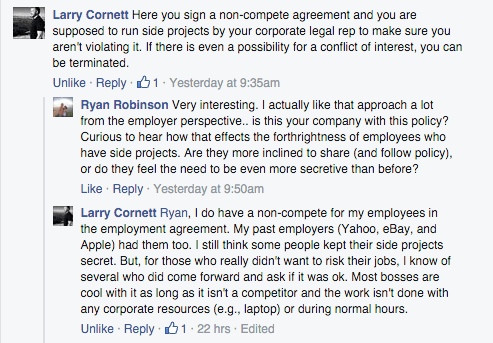A few years ago, during my second job out of college at a clothing startup in Orange County, I was given the ultimatum of letting my side business go, if I wanted to keep my job (and sole source of reliable income).
I vividly remember the conversation I had with my boss, as if it were yesterday.
I was terrified.
Prior to setting a meeting with him to chat about how my first six months on the job had been, he had no idea that I was running a side business in my free time (much more on whether you should tell your boss about your side business or not, below). If you’re still looking for the right business idea to get started on, check out my break down of the 101 Best Side Business Ideas.
I needed to ask for some more flexibility with my schedule for the next month, since I had the opportunity to participate in the LA County Fair, which was a great way to launch my business and gather a ton of objective feedback in a concentrated period of 4 weeks. There was just one problem, the fair was every Wednesday-Sunday for a full month. Not exactly ideal when you have a day job.
So, once we sat down to chat in his office, we started by going over my performance for the past six months, covered my biggest wins, talked strategy for the next quarter, and then it felt like the meeting was just about finished.
It was time to bring up the big question: could I get some schedule flexibility to focus more on my side business for the next month?
The conversation went better than I could’ve imagined.
We talked about what my plans were for my side business, how I saw myself balancing my commitments between the two, and he was even receptive to letting me work staggered, odd hours for the next month, in order to do the fair and keep my day job (because I was over-performing on my targets at work).
I reassured him that I could continue delivering at the same high level of performance, despite working less hours each week and doing some of that work remotely.
He was in. I felt like a champion.
It was a Friday afternoon, and he wanted to confer with his business partner the following week once he was back from a trade show, to make sure they were both on the same page before officially granting me the flexibility. So, I left for the weekend feeling like I had the best of both worlds.
And that next week was when things took a turn for the worse.
My other boss could not have felt more differently about an employee of his running a side business.
Are you committed to this job?
Have you been working on your side business during company time, all along?
Are you just going to quit in another month, anyway?
I fielded a lot of tough questions that I really wasn’t prepared to answer. I thought I had already won this battle. So naturally, my on-the-spot answers weren’t as reassuring as my previous conversation had been.
That talk ended with the ultimatum I had been fearing.
“You’re welcome to stay here and keep doing a great job, but not if you’re running a business on the side.”
My head was spinning for the rest of the afternoon, as I weighed my options. I told them I needed the night to think about it.
Do I keep this job (which I really did like) and effectively place my dreams of being self-employed on hold?
Is my business bringing in enough cash flow to at least give me the bare essentials and cover rent for the foreseeable future?
Do I have enough in savings to justify taking this risk, in the event I’m not able to pay myself a dime for the next few months?
Even though the answers to each of these questions were less than ideal (pretty much a resounding no across the board), I knew in my head what I was already going to do.
The next morning, I turned in my computer, cleared my desk, and quit my day job. I launched into self-employment with a business that wasn’t quite ready to sustain livable salaries for my business partner and I, but I was excited and ready for the challenge.
In hindsight, there are a lot of things I would’ve done differently that could’ve helped me avoid feeling forced to leave my day job too early, and as a consequence placing too much of a burden on my business, that hadn’t yet developed enough cash flow to sustain two full-time incomes. In fact, I wish I would’ve read this post featuring advice from the world’s top entrepreneurs before I started my first business.
We went on to have a very profitable month with Case Escape at the LA County Fair, picked up a lot of momentum, validated the business idea and concept of our B2B Startup Kits, sold the first set for nearly $5,000, and got networked into a group of people that recommended several more good trade shows for us to exhibit at.
However, the business still wasn’t generating enough cash flow to justify paying ourselves a livable wage AND continue re-investing in the growth of the company. So, my business partner and I ended up moving back to our hometowns on different sides of the country for the next 6 months while we cut costs and built our monthly revenue runway.
In many ways, I was actually pretty lucky with the way things shook down.
Even though the decision to prematurely quit my day job launched me into one of the most stressful times of my life, I wouldn’t have done it any other way. The lessons I’d learn over the coming year would go on to define me. And, it forced me to go back to the drawing board and discover my strengths as an entrepreneur.
Plus, there were a lot of things I could’ve done much worse.
My side business wasn’t a conflict of interest (or competitor) to the company I was working at, I hadn’t officially broken any contractual agreements with my employer, and I never worked on my side business during company time.
Whether you’re thinking of starting a side business or you’re already working on one, here are all of my best practices on how to avoid creating a situation that jeopardizes your day job (and reliable source of income). Be careful in navigating these murky waters when you do things like start a blog or launch your own side business.
Here are my 10 Steps to Avoid Getting Fired When Starting a Side Business
Here we go…
1. Know Your Company Policy on Side Businesses.
Many companies actually have formal policies about employees operating a side business. If you didn’t ask, or weren’t briefed on this during your interview and onboarding process, then it’s worth giving all of your employment contracts a thorough read.
If you’re still unsure, or there’s no clear mention on the subject, it is absolutely worth asking someone who’d definitively know the answer to this within your company.
There’s no harm in asking.
Some companies ban or severely limit employees from starting a side business, yet others like Microsoft’s Garage program actually lets employees build their own projects using Microsoft resources, because they believe in the immense value of empowering their employees to start their own businesses. Some companies even change their mind on this policy from time-to-time, just ask Ramon Roy over on the WeWork blog.
When you started your current job, you (hopefully) signed an employment contract and probably some other legal documents. Take a close look at them. One thing you need to look for specifically, is if your employer places limits on whether you can have other employment. Beware of exclusivity clauses, as they are often tied to a non-compete agreement your employer may want you to sign.
Sounds kind of crazy right? While exclusivity clauses are somewhat commonly found in employment contracts, they’re just as negotiable as compensation, start date, and anything else before you actually sign the contract.
I’ve personally had an exclusivity clause taken out of an employment contract before agreeing to sign, simply by asking and telling them that I often do freelance work from home jobs on the side.
If that had been a deal-breaker, then I wouldn’t have been happy working there anyway. It turned out that it wasn’t a big deal to them at all, and was just in their standard employee contract template.
The relatively common exclusivity clause has been one of large political debate recently in a growing number of countries, specifically the United Kingdom and New Zealand, which allow Zero Hour Contracts. With Zero Hour Contracts, you are legally employed for a company, and they can require you to work any set number of hours they need you for, during a given week.
However, the employer is not, in turn, required to give you any guaranteed minimum number of hours, which makes your work (and income) much less predictable by nature.
The Guardian recently reported that, “some companies have even been using exclusivity clauses, meaning their workers are guaranteed no hours, but are prohibited from finding work with anyone else.” The argument being, they need to rely on their employees’ availability.
In general, most companies do not explicitly ban employees from working for anybody else, or having their own side business. However, in exchange for paying you for your time, they will expect to be your first priority if there’s any clash of needs.
As long as your side business doesn’t distract you from the work you’re being paid to do, most employers are going to be supportive, as long as you’re not competing with their business.
2. Read and Understand the Agreements You’ve Signed.
When you started your job, you likely signed one, or all of the following agreements:
- Employment Contract
- Non-Disclosure Agreement
- Non-Compete Clause (often within the Non-Disclosure Agreement)
Examine each of them very carefully, and if there’s anything you’re unsure about, it’s worth the small investment of having an attorney go over them with you for 15-30 minutes. The future success of your side business could depend upon navigating these agreements correctly.
Many companies will insist that employees sign some form of non-compete clause. The most common application of a non-compete clause is designed to ensure that you won’t start a competing business while you’re employed with the company, or within a predetermined amount of time after your employment ends (often 2 years).
However, in the US, many states have complicated restrictions on the enforceability of non-compete clauses, and in California and Hawaii, they are deemed completely unenforceable.
I’ve learned this lesson the hard way myself, after receiving a threat of legal action from a former employer.
Several months after leaving my job at a portable speaker startup (in southern California), and just before I left my next job to go full-time with Case Escape, I was contacted by one of the owners of the speaker company.
They discovered the website for my side business, and felt that it was a breach of my previous employment agreement with them.
Specifically, they felt that I had violated my non-compete agreement, which applied to 2 full years following the end of my employment, and that the business I had started was directly competing with theirs.
Here’s the exact email I got from one of the owners.
Did I freak out? Hell yes.
Did I think I was screwed? Definitely.
Did I actually do anything wrong? Nope.
After (very quickly) finding and consulting with an attorney, we were able to review my employment agreements, verify that the non-compete clause I had signed would not be enforceable (luckily for me, I live in California where these agreements are null and void), and that my side business indeed was not competing with that of my former employer’s.
WHEW.
After a few weeks of not responding to him, knowing that I was legally in the clear, he followed up with me again to check in on if I was still operating my business.
Here’s what I emailed back to him.
To this day, I still haven’t heard back from those former bosses of mine, which is a bummer.
I don’t have any hard feelings against them, as I know they must’ve been acting from a place of feeling betrayed, or that I had used them to get some industry experience in order to launch a competing business.
Had they provided a less hostile environment to talk this situation through, rather than over-reacting, it would’ve avoided a lot of angst on both sides. But hey, it sure sparked a lot of great blog post ideas for me 😉
The point of all this… you need to have an in-depth understanding of the agreements you’ve signed with your employer. Even still, it’s worth having an attorney double-check with you.
Had I not happened to live in the state of California where non-compete’s are void, I may have been forced to go further into the legal process (spending money I didn’t really have), in order to prove that I had not breached any of my signed agreements.
3. Don’t Disclose or Use Proprietary Information from Your Employer.
Without exception, one thing you absolutely cannot do when starting a side business, is steal, use, or share any of your employer’s proprietary intellectual property—any good online business course will teach you this too.
There have been numerous court cases over the years, involving former employers seeking substantial damages (and more commonly cease and desist orders) where there has been evidence of intellectual property theft.
Take this $100M lawsuit for example, between Carter Bryant, the creator of the Bratz line of dolls and his former employer, Mattel. Mattel had alleged that Bryant was in breach of his employment contract because he had done initial sketches and created the first test doll during his time at Mattel while working on the Barbie line.
The court initially ruled that Bryant was liable for $100M in damages. After 7 years of appeals and litigation, a jury eventually overturned the ruling and awarded Bryant’s company $88.5M in damages from Mattel.
To avoid this type of mayhem when starting a side business of your own, you need to very carefully ensure that you’re not accidentally using any of your employer’s proprietary resources and information.
This includes avoiding any patented processes, utilizing trade secrets, and making sure that your ideas are very well-documented and transparent.
4. Don’t Poach Former Co-Workers for Your Side Business.
This one is particularly tempting. You spend so many hours with your co-workers, and built such strong relationships with former colleagues, that it can seem like a natural fit to start working together on a side business.
While my official answer to whether or not you should start a business with your friends or co-workers is, it depends, you must avoid poaching (or inviting) employees from a previous employer, in order to bring them over to your company.
There have been many costly legal battles because entrepreneurs have encouraged fellow (and former) co-workers to jump ship, in order to work for their businesses. This is more common in the startup world, where huge venture funding rounds can catapult what started as a side business, into a rapidly growing enterprise.
While it’s natural that some may choose to join your business down the line, it’s important that you do nothing to encourage them to actively leave the company you previously worked for, or you’ll be at risk of an anti-poaching lawsuit.
5. Don’t Spend Company Time on Your Side Business.
While this one seems like a no-brainer, it’s without a doubt one of the most commonly violated principles of launching a side business.
It often arises out of not properly managing your time (and opportunities), feeling that you’re not making enough progress on your side business, and having a high level of dissatisfaction with your current job. I get the temptation, but you need to exercise extreme discipline when it comes to this matter. It can easily spell out big legal troubles for you.
Let’s make this even more simple.
Your employer pays you to perform a particular set of duties each week. Whether you’re paid hourly, or on a yearly salary, you’re more than likely expected to devote a certain number of hours for your employer’s business each week.
Using the time that you’re compensated for, on your own personal side business, will do you no favors. It’s unethical, unprofessional, and will likely breach the terms of your employment contract.
What’s more is that it often contributes to a decline in performance in the workplace, which can raise negative concerns about your ability to be an effective employee—especially once your employers start to realize you’re making money blogging or otherwise generating a meaningful side income with their time.
Whether you decide to work on your side business during the early hours of the morning (I choose to get started at around 5:00am), or during your late evenings, the real trick will be balancing your efforts and staying at peak performance throughout the work week.
6. Don’t Use Company Resources on Your Side Business.
Just like you should not use company hours to work on your own business, it’s highly unethical to take or use other resources such as notebooks, technology, and tools of your craft that belong to your employer.
For example, if you’re planning on branching out to start your own building construction company, you definitely should not be using tools and other resources that have been paid for by your current employer. Even if they’re tools you regularly use at work, that doesn’t give you a pass to use them on your personal business.
In fact, you need to do the exact opposite. I recommend purchasing, renting, or borrowing everything you need to start your side business, and documenting the fact that you did, indeed source those items elsewhere if there’s any crossover in the tools you use at your day job. This can be as simple as holding on to receipts and getting email documentation of borrowing items from friends.
7. Don’t Use Your Work Computer.
If you have a work computer from your company, it’s obviously their property. Therefore, you should not use it to work on your side business, whether that’s in the office, or at home.
Even if your employer is comfortable with you taking your work computer home, using it to read personal emails, and do with it as you please on your own time, utilizing it for your personal business is both unethical and leaves you exposed to potential breach of your employment contract.
If you need a computer for your business, you’ll have to go out and buy or borrow one. It’s as simple as that.
8. Don’t Use Company-Bought Online Tools and Apps.
Similarly, just because your employer has paid for incredibly useful software and apps, it doesn’t mean that you have the right to use them for your personal business. Again, this is likely a breach of your employment contract.
Here instead, is my list of the 73 essential online business tools that I use to manage my side businesses. Most of them are either inexpensive or free alternatives to the more premium software products out there.
9. Don’t Try to Build a Better Version of Your Current Company.
As I’ve said before, companies are particularly keen on squashing and making an example of current (and former) employees who set up competing businesses, especially if there’s any suspicion of poaching previous clients of yours.
Aside from being a clear violation of your employment contract, and likely one of the limited use cases for a non-compete being held up in a court of law, if you’re creating a business that competes directly with your employer, that’s going to make your life a living hell.
If you manage to avoid a lawsuit, your employment will still most certainly be terminated upon one of your bosses discovering your side operation. Follow the advice you’ll hear in my favorite motivational quotes—strive to be original and forge your own path. Categorize this one as, just don’t do it.
10. Disclosing Your Plans Can Actually Help.
Should you tell your boss about your side business?
It’s actually in your favor (most of the time) to be completely open about your plans to start your own side business, especially when your project is clearly not in direct competition with your employer.
Making the decision to tell your employer about a side business needs to be done either before signing your employment contract, so that you enter to your relationship with mutual agreement, or after fully understanding your company’s policy and your employment agreements on operating a side business.
Don’t just take my word for it.
At his San Francisco-based company VoiceKick App, CEO Larry Cornett, shared with me, “Here you sign a non-compete agreement and you are supposed to run side projects by your corporate legal rep to make sure you aren’t violating the agreement. If there is even a possibility for a conflict of interest, you can be terminated.”
Here’s more of our exchange, talking about some of the do’s and don’ts that he recommends to his employees who start side businesses.
In short, his opinion is that if you’re not breaking any of your employment agreements, you have nothing to fear.
More and more companies recognizing that their employees have dreams of their own, and sometimes they even actively help these ideas come to fruition. There can be massive benefits for employers to nurture their employees in their business ideas.
Richard Branson cites an example of an employee who came to him with the goal of setting up an airline in Australia (quite a lofty goal). Rather than shut him down or force him to take his business idea elsewhere, Branson did something totally unexpected. He decided to work with him.
“Brett Godfrey, a member of the financial team at Virgin Express, our European short-haul operation, approached me with an idea to launch a Virgin airline in Australia,” Branson says. “Brett outlined his plan, I offered my thoughts, and together we hashed out the details on the back of a beer mat. Soon we were on the way to creating the next Virgin business, with Brett at the helm as the CEO of Virgin Blue, Virgin as one of his investors, and myself as his co-founder and mentor.”
Clearly, not every boss or CEO is going to be as welcoming as Richard Branson. However, there’s something to be said for full disclosure of your side business idea.
Imagine if that Virgin employee had gone about trying to start his own airline, especially if he had been tempted into using any of the airline industry-specific resources and contacts at his disposal. Branson probably would not have taken kindly to that approach, and would have had the resources to quickly out-compete a brand new, fledgling airline.
Whether you’re still looking for the right profitable business idea, or you’re already working on a side business of your own, get my battle-tested system for starting and growing a business while keeping your day job (the right way), in The Launch While Working Formula.










Ryan,
Having a side photography business while working with companies have always been a benefit to them (and me when building my portfolio). Often times my bosses (owners of company) have asked me to go out on company time and take pictures for their website, marketing materials, and office decor. Does them asking me to do this void any nonverbal contract? Am I free to use company resources, time, etc.?
Looking forward to your response.
Thanks,
Sabrina
That’s a win-win, but you’re smart to be cautious. I’m not qualified to offer up legal advice, and without reading your employment contract myself, I wouldn’t really be able to give you my definitive opinion on the matter.. but I can give you my insight based on my own experience/contracts.
If they’re proactively *asking you* to use company time to take your personal property (camera and equipment) to shoot materials for their business, I would say you’re completely in the clear. Using the work for your portfolio is highly encouraged. Best case scenario is that these requests are documented over email, but not a big concern in my opinion. What’s most important to note is that your photography business (likely) isn’t competing with the business your current employer is in, which should alleviate all of your concerns.
I always recommend to people in my community that they choose a day job where the activities they’re doing are mutually beneficial to both themselves (future aspirations) and their employer. I liken your situation to many jobs I’ve had where I dedicate a lot of my employer’s time to writing content for their blog, building industry relationships, etc – that all has a clear benefit to my personal brand as well. Hi-five to you, keep it up!
Great post
My planned side hustle will involve interviewing people over the phone. At my FT job, I have an hour for lunch. When I’m in Writing Mode (I write contemporary romance as a hobby), I use one of the smaller conference rooms for privacy. Do you think it’d be okay if I used the conference room to conduct the interviews using my cell and my own laptop?
Great question, Celise. Just to be very clear, I’m not an attorney so my advice shouldn’t be taken as legally sound.. but from my personal experience and consultations with attorneys over the years, my opinion is that you would be in the clear as long as all equipment you’re using (phone and computer) are owned by you, as you stated.
I used to do this exactly while working at a previous job and needing to schedule mid-day (lunchtime) meetings with freelance clients, so it’s very similar to what you’re doing in that respect.
Be hyperaware of any odd looks you may get from a boss or co-worker who’s wondering what’s up. One time I used a conference room at lunchtime to do a podcast interview and since I had a microphone rigged up to my laptop, it was much more clear that I was doing something related to my side business rather than for work–despite it being on my lunch hour, I still got a few weird looks and had to address it in a later conversation with my boss who had caught wind of it from a co-worker.
Overall, my opinion would be that you’re safe with this specific arrangement. Just be aware of any funny reactions you may get from co-workers or a boss, as many employers could feel differently about this utilization of lunch time.
Thank you!This was VERY helpful.
I would be wary of this, in this respect. Make sure the room you use does not have any company branding posters on the wall. I got let go because of that. It turns out the company did not like seeing the posters with their brand. Even though it was a poster, they did not like having it on my hangout broadcast and it did not matter that it was my lunch hour. So be safe, look around you, make sure it is a generic background.
For me it was a blessing in disguise. My mom is sick and I am worried about her and although, new to the job want the freedom to travel if she needs me. Second, I am a seasoned professional, not and highly skilled and tired of being a “slave” to people who don’t appreciate my experience, and near retirement, and am ready to take the plunge. I also realized, that my supervisor did not want someone who was inventive, smart and multitasking, but wanted someone who is available to tow the line. How do I know that? They said I should resign but they had recommended HR to rehire me at any time but not in their department. I see this as a blessing, a time to take my risk, be available to my ailing mother, and to build my business. I have discounted health insurance from a previous company I retired from, a portion of my retirement Investments I can cash in with no penalty to use as I build my business. This is the time to take the risk and build it. I am taking it. I am sick of working for companies not interested in what they can gain from a resourceful person like myself. My boss said it all when he was letting me go, If you apply in another department here, I will be a reference, your skill sets are so impressive and you have so much talent. Well thank you but no thank you, I take that as saying, it is time to be my own boss and rule my own destiny.
Is it illegal for me to make a website for my future business that will be in competition but I would have quit at my current employer for a few months by that time?
Great question! To be clear, I’m not an attorney. So I’m not qualified to give you true legal advice.. and this is definitely something that’d be worth having a quick consultation with a local attorney about.
That being said, my gut tells me that it would be in your best interest NOT to start a competing business (or launch the site) until you’ve fully moved on from your current company. This could depend pretty heavily upon the language in the employment agreement you’ve signed, but most companies want to protect against exactly this—so there may even be an extended period of time that your contract stipulates you’re not legally permitted to start a similar/competing business. Now, whether or not that agreement can be legally enforced depends upon a lot of variable including which state/country you live in and so on… You can see the need for consulting an attorney on this question 🙂
I received my paralegal degree in 2011. I quickly found employmnt at a law firm. I have been a paralegal for one attorney in particular for 5 years now. He has issues with the state bar and may be suspended for 2 years… the verdict can come in one month or 6 months. While it is in appeals, last year he gave me notice of termination since he was taking another job… turns out he did not get the job and I remained employed.
Not feeling secure, I did the one thing I know how to do: paralegal work. First, I met with my boss and told him I wanted to start my own paralegal business on the side. Begrudgingly, he authorized it. 6 months later, my business is doing great and getting better each month. THIS week he approached me (again 6 months after I started my business and still working full time for him)… he no longer likes the idea of my “moonlighting” and feels I am taking potential clients from him. Now, you must understand, I sent him 2 referral clients right away… he made $5,000 from them, but didn’t like their character and told me he didn’t want anymore of my referrals!
Now – he says… either my business or his.
I feel that since he authorized me starting my business and knowing what it entailed that he has no right now to tell me to shut it down and to run it through HIS law office. I have done an excellent job promoting my business and he thinks that he deserves the money that I am making from it.
At the same time, I don’t know if he will be able to provide me a job in 3 months because of his own legal issue… I am protecting myself.
What are your thoughts? FYI: I am expecting to get fired tomorrow.
Wow! First of all, that IS pretty crazy, I’m sorry to hear that Denise. Rather, I’m sorry that your boss seems to be a bit too far down the crazy path to hope for any return to normalcy.
My advice is to go into tomorrow mentally prepared to leave. You have to weigh whether or not you’d be open to pursuing legal action against him if he gives you an ultimatum about quitting your side business. Did you get that authorization from him in writing? How about if there are any clauses in your employment contract about side work?
Personally–and again I’m not an attorney–I’d suggest leaving that asshole’s law firm anyway based solely on the principle that he clearly sucks and you don’t need that negativity in your life.
It sounds like you’ve worked hard to build what you have, is it to the point that it could sustain you for a little while as you look for a new part-time/full-time opportunity?
Hi Ryan,
Great article by the way, it provided great insight into many questions that I had! I had a quick question related to working a side-business: my wife and I are both licensed Realtors and work for a brokerage in Beverly Hills remotely. Now, presently, I have a full-time job working at a charter school doing remote work at a work site (physical building). Is it unethical or illegal to let a coworker know that I am a Realtor if they are interested in buying a house, even if I communicate everything off-work hours/with my own personal equipment (cell, laptop, etc.)? I have Googled just about every possible scenario of this, even researched real estate principles, and have not found a law or anything regarding helping a coworker purchase or sell real estate.
Good question, Josiah!
Personally, I don’t feel that it’s unethical to mention that to your co-worker, especially if it’s done outside of work hours. That’s covering a lot of bases—and in my (non-lawyer) opinion, there’s no conflict of interest there. It sounds to me like your work with the charter school is very different than what you’re doing with the real estate.
Use those relationships and connections as much as you can.. and hey if you have a friend who’s an attorney (or knows one) that’d be willing to speak with you for ~15min about this, then it’d be a worthy investment for your peace of mind.
How does it work if your employer is a startup, you started with them as a freelancer, and grew your position to where they offered you full time? I have no contract and no non-compete. Am I free to do as I wish or are there any laws to be aware of in regards to non-compete or working with past customers?
Great question, Jimmy! So to be super clear, you have no contract AND no non-compete agreement signed with your current employer? From my perspective, you’re pretty much in the clear to do as you please—obviously I wouldn’t recommend going out and trying to work with a competitor of their’s since that’d be a conflict of interest. Even though you don’t technically have a contract with your employer, if you’ve been doing consistent work for them (and being financially compensated for that), there *could possibly* be a case they could make if you were to work with a competitor.
I think the bigger question at-hand here is, why don’t you have a contract in place with your FT employer? I’m assuming you’re based outside of the U.S. as that’s certainly not standard practice here. If I were you, I’d be doing everything I could to go out and drum up more clients on the side of this job, because you don’t have much security from this employer if you’re not under any contracts/agreements whatsoever.
Even still, you’d be smart to try and avoid pitching previous customers of theirs on the exact same service offering while you’re still working FT for your employer (for the same conflict of interest reason as above). I couldn’t give you a definitive answer whether or not it’d be *legal* to do so, as I’m not an attorney, but my intuition tells me it’s not smart to do, in any case. There are a LOT of companies out there, I’m sure you can start finding leads in a pool of similar leads.
Question: my current employer markets services which I’m considering starting a side company. However although the market it they actually employ subcontractors to perform the work. Would this still be competing directly with my current employer if my side business would mean that I would do the same. Start a business we’re ill subcontract the work? I hope this isn’t too confusing.
Good question, Monica! This is definitely a grey area situation if you ask me (I’m not an attorney, so don’t take my thoughts as legal advice). That being said, what I come back to at the end of the day with what you described to me is that (1) you’ll be collecting money from clients for the same exact service that your FT employer also offers and (2) the clients you take on for your side business *could* potentially be a fit for being clients of the company you work for FT.
Is that correct? If so, my (non-professional) advice would be to *not* pursue offering these services that your FT employers also offers—with the important distinction that there’d probably only be a conflict of interest here while you still work for the company. If you were to move on and get another FT job, I’d think you would be safe in actually pursuing this service as a side business then… as long as you’re not directly trying to poach customers from your previous employer, which could throw you back into some grey area.
California Labor Code Section 96 provides the Labor Commission shall investigate “(k) claims for loss of wages as the result of *** discharge from employment for lawful conduct occurring during nonworking hours away from the employer’s premises.”
You may or may not have a claim against your former employer for when they asked you to quit your side business in order to keep your job.
🙌 thanks for sharing, Robin!
Really useful reading this, and I’m stuck in a bit of a dilemma. I work at a strategy consulting firm for non-profits. Currently, I was hoping to pursue two types of clients:
1. Other consulting firms that do non-profit consulting
2. Companies that need help with CSR strategy
The only thing my contract states that I can’t solicit ‘potential customers’ during my stay at the company for myself or anyone else. My company is reasonably informal and I have strong relationships there.
My worry is that client type 1 above may be a competitor (though they go after different types of organizations in the non-profit world – mostly charities, whereas my company goes after large foundations and multilaterals).
It seems that even client type 2 might involve a conflict of interest. Even though my company doesn’t currently go after CSR, I know there have been talks about to do in the near future (though it’s likely that most CSR organizations won’t be able to afford my company).
What do you suggest? I have two options in mind – do strategy consulting for a different type of organization (maybe startups – but where my experience their is limited, even though the skillsets are similar) or check with my company before I take in any non-profit type clients. Would be great to hear your thoughts.
Great question! Personally, I think your best course of action is to just talk through these options with your manager/boss since you feel you have a great relationship with them (and you haven’t actually started doing any outside consulting yet).
But from my perspective, I’d think you’d be totally in the clear offering strategy consulting to any non-profit that’s in a different space than your current employer. Different subject matter, different types of donors, different recipients. That sounds pretty straightforward. If you do explore consulting to other types of businesses in general (like startups, SMBs, etc) then I’d expect you to be 100% in the clear.
TL;DR try talking it through with your manager if you’ve got a good relationship. Pitch it as a scenario.. “this non-profit reached out to me and was wondering if I could do a little bit of strategy consulting for them when I have time on nights/weekends.” see what they have to say 😊
Thanks you so much for this
I’ve started a part time realty business but strickky after hours and weekends
My boss do t know yet as I feel I do this to sustain my family responsibility as the company is not paying me enough money
I do advertise my business on social media so they bound to find out
Be careful with this. I was doing the same (getting a RE business set up on the side) made a social media post, employer found out, now am on a final warning and was told to cease all RE activities. I would disclose if I were you.
Great article Rob and I felt the need to write as recently I was almost fired from my job. I was running a few side businesses, opening up online stores selling affiliate products from Amazon, Ali Express and EBay. I worked for the Swedish clothing retailer H&M and didn’t know at the time about the policies of my companies approach on setting up a side business. I spent a lot of hours on my businesses and this affected my timekeeping and absence. I was put in a disciplinary and had to confess my online activities. The verdict of the disciplinary was a final written warning. They told me to cease all online activities and close down my stores. They deemed my offence as misconduct and said I’d violated some of the terms in my contract. I was warned if I ever went down that path again, I would not only be fired but serious action would be taken against me. I did not know what that meant until I read this article. The thing is, I just dived head first into setting up my business because with the erratic unpredictability of our economy, I needed to createva safety net for my family. I think next time I plan on setting up a side business, I need to be more careful. Its a shame though that some companies put these agreements in place as to stop employees from being the best that they can be.
Glenn Riley
Hello Ryan! I started my initial side business research and set up an email on my current FT employers laptop. I just ordered a Chromebook and plan to conduct all work from here on out on my Chromebook when I get it in a couple weeks and plan to do any remaining research on my phone (which I own). I logged out of the Gmail account I set up for my side business and shared all the Google drive documents with my business but partner. Are there any other precautions I should take. For example starting a new email account so none of the new information is traceable to what I created on my company’s laptop?
Thanks!
Nicely researched and then served to the audience. Not all bloggers do this. Thanx for delivering the genuine information.
very interesting ive learned something new today. Im Walter Makgosa based in south africa am employed and having a side business i need more tips to avoid getting fired while working for my side business
Ah, well you’ve come to the right article Walter! Wishing you all the luck with your side business 🙂
Hi Ryan,
My name is Chris and I have to say this article was very eye opening!
I desire to start a business of my own wholesaling real estate. I work for a roofing company as a commisson based employee. While I’m not at an appointment I will usually take snap shots of houses that I think would benefit my side hustle.
Sometimes I mention to roof customers that I could help them wholesale their house if it is an option for them. This doesn’t seem like its in direct competition with my current employer but I want to be safe than sorry. I have one customer in particular who is waiting on buying a roof from me to see if she might work with me on the wholesaling side. After reading this article that feels like a conflict of interest that I didn’t connect the dots on before. Would you mind helping me figure this out?
Thanks,
Chris
Hey Chris, that’s a really good question! And while I’m not as well-versed on this topic as a lawyer would be, the main question I like to ask myself when evaluating a conflict of interest question would be… could making a wholesale deal with a roofing customer be at all in conflict with the business my employer (the roofing company) runs? And as you’re saying, if the roofing contract is being held up to wait and see if you’ll be able to do a wholesaling deal with the customer *first* then I think you might be in some questionable territory there. My advice would be to shift your approach to bringing up the possibility of wholesale deals after a roofing project is either complete or at least well under way. That should lessen the possibility of something going awry in the eyes of your employer.